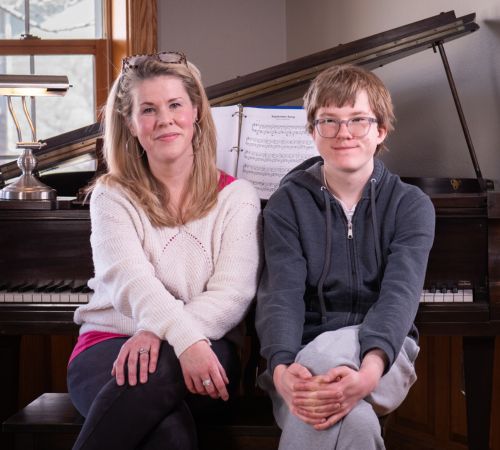Autism Awareness Month at Regis: Neurodivergence, motherhood and academia
UPDATE May 19, 2025: The companion video for this feature is now available to view below. (Originally published April 25, 2025.)
On April 16, 2025, Health and Human Services Secretary Robert F. Kennedy Jr. declared autism to be an “epidemic,” following his call to search for the “cure” of autism the previous week. Since Kennedy’s appointment in February, neurodivergent and disabled Americans have felt an increasing pressure on their right to exist in the country.
In honor of Autism Awareness Month, meet Melissa Bosworth, an autistic woman, assistant professor of Health Ethics and Leadership at Regis University, and founder of Vertical Strategies, a consultancy serving health-focused nonprofits.
Having worked with adults with disabilities for a large portion of her career, Bosworth has been woven into the disability community. Despite this proximity, she missed something life-changing for most of her life – her own neurodivergence.
In 2017, after her son, Elijah, struggled to thrive in traditional public school, Bosworth and her husband decided to have him evaluated for autism. In this process, both Bosworth and her husband were advised to be evaluated alongside their son. That same year, all three family members received diagnoses for autism.
In receiving her diagnosis as an adult, Bosworth spent many introspective hours looking back at social struggles she experienced in her childhood and in education, much like her son.
“I'm grateful, you know, because my son was diagnosed early, so he doesn't have to go through a lot of childhood hardships,” Bosworth said. “But you know, even family members today will be like: ‘Melissa, you don't look like you have autism.’”
According to Bosworth, women just like her have been historically underdiagnosed for autism and more often only get evaluated when their children are. In her experience, she was expected to “mask” her autistic traits more rigidly than her male peers.
Bosworth described how she struggled to socialize as a young woman, feeling disinterested in or confused about the interests of her peers and family. Processing her diagnosis through her childhood informs, in the present, both how she parents and the way she teaches.
“You see things in yourself and see them mirrored in your child,” Bosworth said. “It gave me more credence to say, you know, it's okay if my child goes and spends a lot of time in his room, it's okay. If my child wants to read things that are not appropriate, he'll censor himself, or those kinds of things. I was able to validate my parenting style a little bit more."
As a professor, Bosworth prides herself on bringing accommodations to the classroom, working with each student to build a course format tailored to their needs. She will update the curriculum to center the student and their abilities, so they are able to show their best selves.
Having worked at the university for nearly ten years, Bosworth emphasizes the importance of disability accommodation and normalization for faculty, staff and students. Working in a large community of neurotypical and neurodivergent people together, Bosworth feels like she’s “found her people” among the academic community.
“Through grad school, I loved it so much because there were other people that I could just nerd out on whatever topic,” said Bosworth. "I'm not looked at as strangely. I can go into these nuances of topics, and others will come with me along that journey. I would dare to believe that there's probably a ton of undiagnosed neurodivergent faculty and staff around Regis right now.”
For Bosworth, opening up to the community about her autism diagnosis has been a difficult task. Many autistic adults like Bosworth have felt wary to disclose their diagnosis out of fear of their diagnosis being denied or not knowing if every space is safe to share.
As the environment of the United States becomes more unsteady for neurodivergent Americans, Bosworth hopes to inspire others to advocate for their needs, while holding space for autism in their own lives.
“I hope that other people will come forward, even if they're just questioning,” said Bosworth, “and for those who aren't questioning or are neurodiverse, I hope they learn something seeing that, you know, that autism is a spectrum.”
